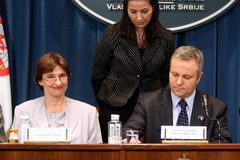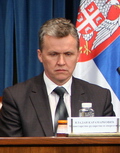Q:
A:
Third phase of remote heating project ready to start
Belgrade,
13 April 2006
Serbian Minister of Finance Mladjan Dinkic and director of German KfW Entwicklungsbank (KfW development bank) Elke Hellstern signed an agreement on loan and financing the project to rehabilitate Serbia’s remote heating system.
The total value of the agreement is €32 million, €10 million of which is the German government’s donation, €12 million was provided through KfW’s soft loan while the remaining €10 million was secured by domestic partners.
Dinkic said after the signing that two phases of the remote heating rehabilitation were already completed in Belgrade, Nis and Novi Sad and added that the two phases cost €17.5 million.
Dinkic called on local authorities facing problems with heating system efficiency to contact the Ministry of Mining and Energy and thus join this project.
KfW Director Elke Hellstern said that the cooperation with the Serbian government so far has been very successful and noted that it will be continued and expanded to new partners.
She pointed out that this programme has been carried out thanks to successful cooperation with the Ministry of Mining and Energy, which is in charge of implementing the programme.
Dinkic said after the signing that two phases of the remote heating rehabilitation were already completed in Belgrade, Nis and Novi Sad and added that the two phases cost €17.5 million.
Dinkic called on local authorities facing problems with heating system efficiency to contact the Ministry of Mining and Energy and thus join this project.
KfW Director Elke Hellstern said that the cooperation with the Serbian government so far has been very successful and noted that it will be continued and expanded to new partners.
She pointed out that this programme has been carried out thanks to successful cooperation with the Ministry of Mining and Energy, which is in charge of implementing the programme.
Assistant Minister of Energy and Mining Vladan Karamarkovic said that the ministry representatives have talked with representatives of the Kraljevo, Sabac and Valjevo local authorities with the aim of including three towns in the third stage of the programme.
He said he is pleased that the contract has been signed because it will help increase energy efficiency, revitalise and modernise the remote heating system in Serbia as well as fulfill all criteria regarding environmental protection. Electric energy will be less used for heating which is also in line with Serbia's Energy Development Strategy.
German Ambassador to Serbia-Montenegro Andreas Zobel, who also attended the signing ceremony, stressed that the aim of the programme is constant efficiency in supplying heating to all citizens connected to the remote heating network, improvement of living conditions for Serbian citizens, as well as protection of the environment, that is reduction of greenhouse gas emission.
He added that the programme will provide heating to 330,000 households and 19,000 institutions, or to around 70% of users of the remote heating system in Serbia.
He said he is pleased that the contract has been signed because it will help increase energy efficiency, revitalise and modernise the remote heating system in Serbia as well as fulfill all criteria regarding environmental protection. Electric energy will be less used for heating which is also in line with Serbia's Energy Development Strategy.
German Ambassador to Serbia-Montenegro Andreas Zobel, who also attended the signing ceremony, stressed that the aim of the programme is constant efficiency in supplying heating to all citizens connected to the remote heating network, improvement of living conditions for Serbian citizens, as well as protection of the environment, that is reduction of greenhouse gas emission.
He added that the programme will provide heating to 330,000 households and 19,000 institutions, or to around 70% of users of the remote heating system in Serbia.
Zobel said that through the KfW, the German government has in the past period invested €330 million in Serbia, mostly in the energy sector, but also into the water supply and banking systems.
Germany also participated with over €100 million in the programme of further implementation of economic reforms in Serbia, improvement of employment and professional training, as well as small and medium-sized enterprises, added Zobel.
He also praised the successful cooperation with partner organisations in Serbia and confirmed that Germany will remain a reliable partner to Serbia on its road to EU integration.
Germany also participated with over €100 million in the programme of further implementation of economic reforms in Serbia, improvement of employment and professional training, as well as small and medium-sized enterprises, added Zobel.
He also praised the successful cooperation with partner organisations in Serbia and confirmed that Germany will remain a reliable partner to Serbia on its road to EU integration.













